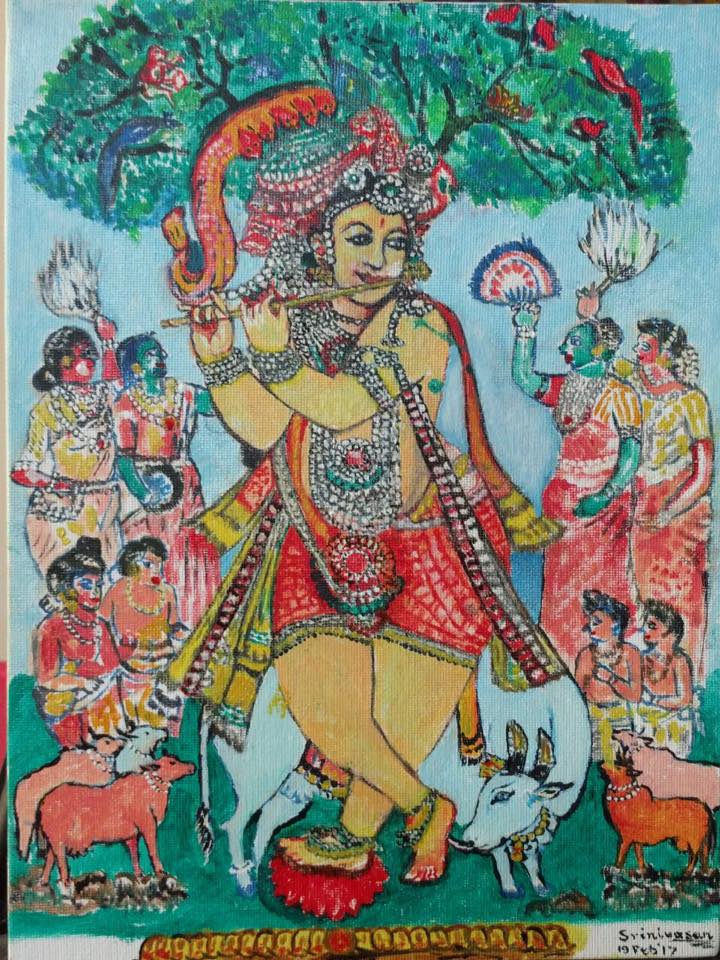பகவத் கீதை 03
Mahabharata – Bhishma Parva
(Gist of Bhagavad Gita)
Krishna continued.
“This body is called Kshetram, one who knows thus is called Purushan. Know me as Kshetrajgnan who is in all Kshetrams.
“The ten Indriyas (Karma and Gnana) the five elements viz Space, Air, Earth, Water, Fire and their five properties, Ahangaram, Mahan, Prakruti these twenty four elements make the Kshetra. The 25th is Jeevathma which resides in the Kshetra and the 26th is the Paramatma, the Supreme Lord.
“Not disrespecting great men, not having pride, not hurting others, having patience and mind control, not subject to sense objects, not having attachments, always thinking about atmagnana, having Bhakthi to the Supreme Lord, these are called supreme knowledge. With this only one can reach the Kshetrajgna. Those Purusha having contact with Prakruti are bound by three gunas and earn karma which is reason for various births.
“I have thus told you the secret which is not even known by Devas and Rishis.
உம்பருமுனிவர் தாமும் யாவருமுணராவொன்றை
இம்பரின்றுனக்குநானே இசைவுற உணர்த்தாநின்றேன்
ஐம்பெரும் பூதத்தானும்மைத்தனவுடலம் யார்க்கும்
நம்பனுமொருவனுள்ளே ஞானியாய் நடத்துகின்றான்
(வில்லி பாரதம், வீட்டுமப்பருவம், 5)
“People reach Kshetragna the Paramathma through Karma, Gnana and Bakthi. They reach a Guru to gain this knowledge and reach me.
“I create beings from Prakruti. They are bound by tri gunas. Satva guna gives them knowledge, Rajo guna gives them action, and Tamo guna gives them laziness and lack of knowledge. One who ignores the action and results arising out of tri gunas, and always think about Paramatma reach Him.
“This world is considered to be an inverted pipal tree, with Brahma as root in the top, and other jeevas in the bottom with lot of leaves. One should cut this pipal tree with vairagya and surrender to the Lord to reach him. Jeevas take with them the karma vasanas when they leave a body and take rebirth. Unless one treats the body and atma separate and understands the jeeva swarupa, the cycle of birth and death continues. The Tejas of Sun, Moon and Agni are mine. I use them to nurture the jeevas. I am the Akshara (changeless), the Purushottama.
“The jeevas are of two types, the devas and the asuras, based on their gunas. The devas understand that this life is subservient to the Paramatma and lead a Satvic life. Asuras think that jeevas are born simply from the kama between men and women. They lead the world to destruction because of their materiastic desires. They fall further down in each of their births.
“The nature of individual jeevas is decided by the type of food they eat. The karmas of jeevas are expressed through their gunas. Any karma done with selfish motives are called tamasic.
“The jeevas should avoid thinking that he is the doer of any karma and surrender to the Lord the result of any karma. That is possible only with utmost Bakthi to the Lord, with which he reaches him. For him the I become the protector, taking care of his welfare. With all the thoughts, speech and actions one should surrender unto me leaving aside any karmic Dharma. I protect him and take him to Moksha without fail.
சர்வ தர்மான் பரித்யஜ்ய மாமேகம் சரணம் வ்ரஜ
அஹம் த்வா சர்வ பாபேப்யோ மோக்ஷ இக்ஷ்யாமி மாசுச:
(Krishna Charama Sloka, Vyasa Bharatam, Bhishma Parva)

(Namperumal, Srirangam – Pencil Drawing)
“I have taught you the most important secret of life. Don’t tell this to anyone who is not really interested in this and those who are bound to misinterpret it. If you want to learn more, go to a Guru, fell on his feet and learn.
“I have already decided the fate of these warriors and you are only an instrument to me in this war. So rise and enter the battle without any hesitation.”
On hearing this, Arjuna shed all inhibitions and rose up with his Kandeeva to enter the war with renewed vigour.
Sanjaya was astonished to hear these sacred lessons with the blessings of Sage Vyasa. He told Dhritharashtra, wherever Krishna is there and accompanied by Arjuna with his bow, victory is certain there, this is my opinion.
யத்ர யோகெஸ்வர: க்ருஷ்ணோ யத்ர பார்த்தோ தநுர்தர:
தத்ர ஸ்ரீர்விஜயோ பூதிர்த்ருவா நீதிர்மதிர்மம
(Vyasa Bharatha, Bhishma Parva)
Previous Gita 02
Next Krishna’s Anger

[…] Next Gita 03 […]
LikeLike
[…] VI Bhishma Parva1. Gita 012. Gita 023. Gita 03 […]
LikeLike
[…] Previous Gita 03 […]
LikeLike